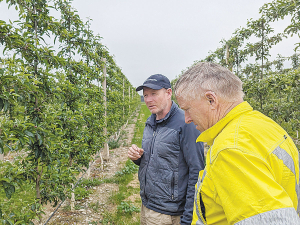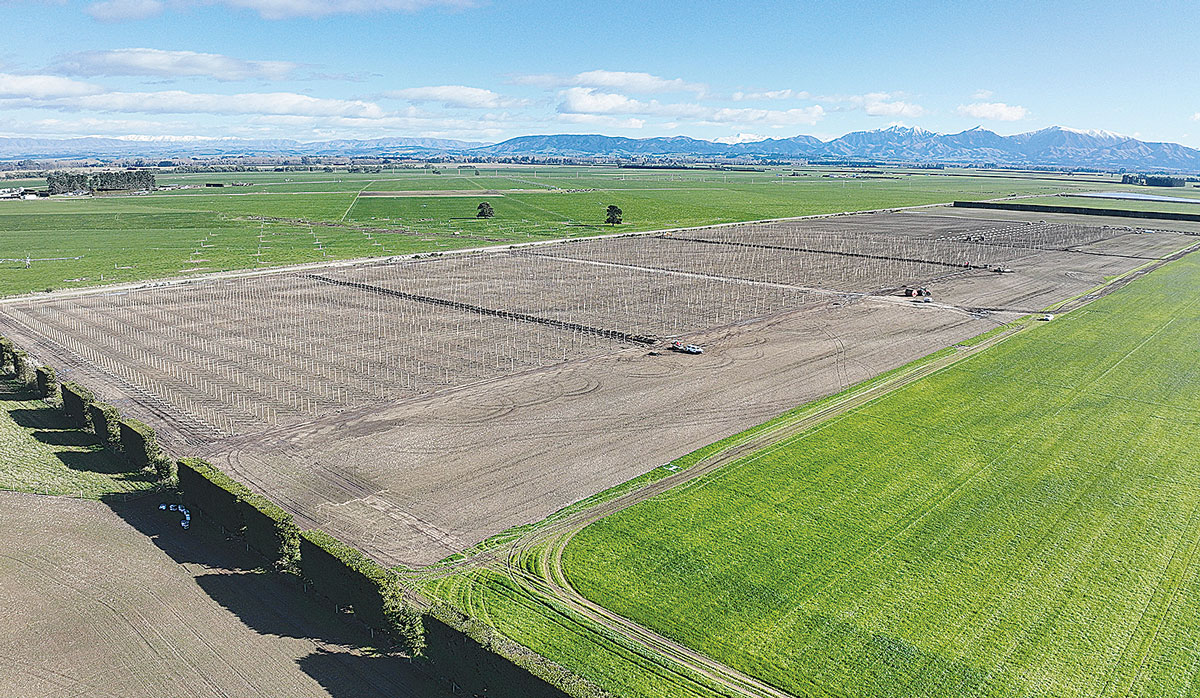Rockit Global appoints COO
Rockit Global has appointed Ivan Angland as its new chief operating officer as it continues its growth strategy into 2025.
 Murray Turley, right, with his company agronomist Dominic Cosgrove in their small trial orchard where they will continue to test other varieties and management methods as the company branches into apple production. Photo Credit: Nigel Malthus
Murray Turley, right, with his company agronomist Dominic Cosgrove in their small trial orchard where they will continue to test other varieties and management methods as the company branches into apple production. Photo Credit: Nigel Malthus
One of the power farming families of South Canterbury is branching out into orcharding with the establishment of a large apple orchard, near Rangitata.
The orchard is a joint venture between Murray and Margaret Turley’s Turley Farms Limited and the owners of the Rockit brand, Hawke’s Bay-based Rockit Global.
With about 50,000 trees recently planted on a 20ha plot on Turley’s 1150ha Rangitata property, the orchard is expected to produce its first commercial quantities of Rockit apples by 2025.
Murray Turley told Hort News they began exploring the potential for pipfruit in South Canterbury two and a half years ago, with the company agronomist Dominic Cosgrove visiting Hawke’s Bay to assess possible varieties.
He says another advantage is the scale of orchard they can bring to Canterbury’s open plains.
“We’ve got rows here that are 900-plus metres long which leads to a lot of efficiencies. That’s the beauty of a greenfield site.”
The chosen paddock, unsuitable for onions or potatoes, was in wheat last year and would have gone into process peas if the orchard had not gone ahead.
“We grow a lot of wheat, grass seed, white clover, peas and hybrid vegetable seeds on this property, and lamb trading in the winter.”
The Turleys are wellknown in South Canterbury, being instrumental in establishing Farmers Mill, which produces all the flour for Griffins NZ, as well as the onion processing plant, Southern Packers. Both are examples of their supporting the farmers of the district to collaborate in getting produce to market.
They are also looking for further investors to eventually expand the apple orchard to at least 100 ha over the next three years.
The Turleys are also major shareholders in the country’s biggest corporate dairy company, Dairy Holdings, where Murray is a director.
But he says the district has now seen ‘peak cow’. “We’re surrounded by dairy farmers here. Our water’s reasonably expensive, so it’s probably time to look at what we can do better with that irrigation water.
“Some of the arable crops are just a bit of a struggle at times to get the revenue to offset that water charge.”
Turley says Rockit apples emerged as a standout opportunity, offering excellent eating characteristics, a unique consumer proposition and brand, great growing support and premium returns for growers.
Early apples from a small trial orchard, near the site, were independently tested for parameters like colour, size, and internal characteristics – giving them the confidence to proceed with the main orchard.
Rockit has been bred as “the world’s first miniature apple” and is further differentiated in the market by being sold prepackaged in recyclable plastic tubes.
Cosgrove says they chose Rockit because larger varieties may be hampered by the South Canterbury climate.
“Some of the other varieties – Envy or other ones where you’re trying to compete on size – the market just wants a big apple. Then if we’re going to be 10% smaller based on climate and growing degree days we may not be able to compete head-to- head,” he told Hort News.
“But with a miniature apple we think we can hit that mark pretty effectively.”
Cosgrove says they should also achieve better colour and the lower humidity may also work in their favour.
“We have more of a differentiation between cool nights and warm days than, say, Gisborne or Hawke’s Bay, so that accentuates colour.”
Employment Opportunities
The orchard has been established on a 2D post-and-wire system, with trees 1.5m apart to be trained along eleven wires in each row. The rows are 2.8m apart.
By going away from a traditional goblet or bush shape the trees will eventually form slim vertical walls for maximum and consistent light interception, which will in turn give consistent colour to the fruit.
They will be drip irrigated from the Rangitata South Irrigation Scheme. Solid fertiliser is currently being applied by GPS-enabled machinery but fertigation is planned down the track.
 |
|---|
|
Turley Farms' new 50,000-tree Rockit apple orchard takes shape near Rangitata on the South Canterbury plains. Photo Supplied. |
About 3% are pollinator trees – Granny Smith, chosen because it flowers just a little before the Rockit.
Turley says the orchard will employ “quite a lot” of workers particularly in the establishment phase when there is a lot of work in training the trees to grow along the wires.
“But then once it’s trained, it’s more programmable,” he told Hort News. “It’s more ‘paint by numbers’ and it’s easier to give instructions.”
Meanwhile Cosgrove explains that you can give someone three or four rules to go through in terms of pruning and tree training.
“They can go through and do more or less the same thing on each tree – with some slight tweaks, probably – but it’s much easier to train someone. Ten or 15 minutes, you can give them a good broad overview.”
With a traditional bushy tree every tree is different and it’s much harder to train someone to assess each tree and understand the right thing to do.
Turley adds that the 2D structure will also lend itself well to robotic harvesting when that becomes viable.
Cosgrove says they will maintain the trial orchard as their test bed for management techniques, such as assessing how best to thin the crop for the optimum amount of fruit each tree is capable of carrying. Being two years ahead of the main orchard, it will give them “a good steer” on what is happening or needed in the main plot.
“This trial gives us the opportunity to try a few different things and see what works and what doesn’t in relation to the bigger orchard.”
Controls on the movement of fruit and vegetables in the Auckland suburb of Mt Roskill have been lifted.
Fonterra farmer shareholders and unit holders are in line for another payment in April.
Farmers are being encouraged to take a closer look at the refrigerants running inside their on-farm systems, as international and domestic pressure continues to build on high global warming potential (GWP) 400-series refrigerants.
As expected, Fonterra has lifted its 2025-26 forecast farmgate milk price mid-point to $9.50/kgMS.
Bovonic says a return on investment study has found its automated mastitis detection technology, QuadSense, is delivering financial, labour, and animal-health benefits on New Zealand dairy farms worth an estimated $29,547 per season.
Pāmu has welcomed ten new apprentices into its 2026 intake, marking the second year of a scheme designed to equip the next generation of farmers with the skills, knowledge, and experience needed for a thriving career in agriculture.

OPINION: Here w go: the election date is set for November 7 and the politicians are out of the gate…
OPINION: ECan data was released a few days ago showing Canterbury farmers have made “giant strides on environmental performance”.